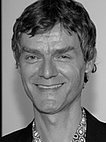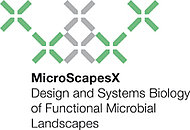MicroScapesX
Design and Systems Biology of Functional Microbial Landscapes
Microorganisms impact the biological processes of nearly every conceivable habitat on Earth – from the water in the oceans to the inside of the human gut. Microorganisms colonize such habitats spontaneously and form assemblies of up to thousands of different species. But how is the formation of these assemblies controlled?
Microbial multispecies assemblies exhibit a highly dynamic nature, and their spontaneous formation may have very severe consequences (e.g. material destruction, disease). In other cases, spontaneously formed assemblies can be very beneficial, for example in reactors for biofuel production or for waste treatment.
How microbial landscapes are shaped
The basic principles that control microbial multispecies assemblies remain largely unknown and underexplored. This knowledge gap limits our capacity to engineer and manage multispecies assemblies with a view to fulfilling or restoring functions that are far more complex than could be achieved by manipulating single species. The main aim of this project is thus to study the formation of microbial multispecies assemblies, and to develop quantitative and predictive models for their formation and behavior when manipulated.
Prediction of dynamic formations
First, we will study simple species assemblies. We will investigate how the assemblies develop as a function of environmental conditions, of the species themselves and the way they interact. On the basis of this, we will develop mathematical models and computational tools to predict the dynamic formation of assemblies on surfaces – the formation of actual "microbial landscapes" or "microscapes". Predictions from the models will be experimentally tested. Finally, we will determine whether the results can be used to predict the "spontaneous" formation of assemblies on skin surfaces in burn-patients. We will also study "disturbed" microbial assemblies in soils heavily polluted by toxic compounds, and will attempt to introduce self-organizing beneficial microbes that can restore the functionalities of the disturbed areas .
| Principal Investigator | Prof. Jan Roelof van der Meer, Department of Fundamental Microbiology, University of Lausanne |
| Involved Institutions | EPF Lausanne, ETH Zurich, UniL-CHUV |
| Number of Research Groups | 5 |
| Project Duration | Feb. 2014 – Jan. 2018 |
| Approved SystemsX.ch Funds | CHF 2.530 million |
Updated July 2014


